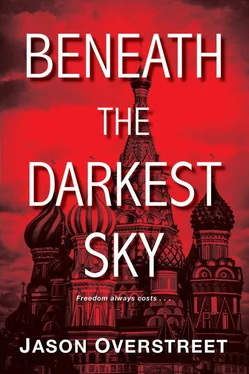“Neither am I,” said Lovett. “Why do you think I’m pining to get out of Moscow for a while and take that job in Kuybyshev. I’m not afraid to try anything new.”
“Why are you moving?” I said.
“It’s not permanent,” said Lovett. “I’m just exhausted with some particular members of the CPUSA. They don’t seem to share my views about the importance of America’s Negro problem as one that is wholly independent of class. I keep telling them that Jim Crow is not a damn class problem. It’s a race problem. I need the Party to be more proactive in addressing race as a singular issue. All they say is, ‘The Party’s aim is to lift all boats, and that includes the impoverished American Negro.’ Fuck that! Pardon me, ladies.”
“Well, we hate to see you move,” I said. “You’re like family to us. And the kids will miss your demonstrative storytelling. They adore you, brother.”
“Not a move actually,” he said. “Just more like a one-year sabbatical from the Party politics here in Moscow. I’m worried I may hurt somebody. During the Third International this summer, I nearly strangled three white members of the CPUSA. No one, including that damn nigga William L. Patterson, shares my sense of urgency when it comes to the Party tackling the issue of race in America. That was the entire point of my joining the Party. Guess I shouldn’t say that about ol’ Patterson. He sees it my way, but he just doesn’t like my flamboyance and the way I aggressively approach the whole thing. I’m not the go along to get along type. And I’ll dress the damn way I wanna dress.”
“I love that you dress like a Cossack,” said Loretta.
“Well, then, go on ahead and paint me, girl!” he said, raising his hands in the air and laughing. “I make a damn colorful subject!”
“Yes, you do,” said B, kissing him on the cheek.
“A sabbatical in Kuybyshev, huh?” I said, not so keen on joining the playfulness. “Will you still be teaching?”
“Oh, yeah! Already have a job set up down there teaching chemistry. Gonna teach some boxing, too. Y’all didn’t know I was a boxer I’ll bet!”
“No,” said Loretta and I.
“Yep! Will be good for me to take a reprieve from all things science and politics. And B is going to keep her job here in Moscow. We’ll meet at the halfway point in Glazov about once a month. I just really need this break. Trust me.”
Magadan, Russia
August 1938
SUMMER HAD COME AND ALMOST GONE. I COULD NOW SAY I’D OFFICIALLY been a prisoner for one year, starting from that initial arrest back in Moscow. James and I had been hardened, meaning we didn’t speak much about our condition, we just lived from minute to minute, thankful at the end of each day that we’d survived to see the sun go down.
As far as my killing the guard in the punishment isolator, the aftermath had played out as I’d imagined, with NKVD officials certain that Vladimir had gotten drunk and fallen into the sewage hole. For months now the hole had remained covered and sealed. And the guard certainly wasn’t missed. I’d even overheard one officer say, “Vladimir was a fucking pathetic drunk, terrible at his job. It was just a matter of time before he would have gotten shot by the bosses for being a shitty guard anyway.”
Commander Koskinen had been pleased with my cost estimate for the big vehicle storage facility, but he’d also liked some other engineers’ offerings. Regardless, the project still hadn’t gotten under way yet, and I was overseeing a brigade of zeks tasked with constructing a new medical barracks made of stone, as the current wooden one was so weathered it was about to blow over from the strong sea winds.
I’d learned some unspeakable news from Koskinen about the group of hundreds that Yury and Boris had been a part of. Eighty percent of them had died along the Road of Bones before making it to the mines, and the remaining twenty percent had passed away shortly thereafter. Why they had even bothered to send them all on such a suicide mission was incomprehensible. Koskinen’s answer: “They got at least one good month of excellent mine work out of that twenty percent, and that’s lives well spent as far as Stalin’s concerned. He reasons that there’s an endless supply of bodies.”
My weight had originally gone from 200 to 180 to now 170, and I only knew this because a nurse had weighed me during a two-day stay at the medical barracks during my bout with dysentery. My recent concern, however, was less about my own health and more about James’s. He had developed a cough and dizzy spells that were plaguing him more and more regularly.
After his couple of visits to the incompetent doctor, I was finding it heartwrenching to have to begin telling James, “Try not to show your sickness, son, because if they suspect that you’ve developed something chronic, God knows what they might do. Close your mouth, grit your teeth, and cough into the back of your throat and the air will expel through your nose. If you feel dizzy, get on your knees and at least act like you’re hammering nails into the floor or lower wall. But always remain looking busy. You can cough freely once we get into our bunks tonight.”
It was on this last Sunday of August 1938 that I looked at my son convulsing, struggling to hold his cough while helping me frame a wall, that I knew I had to do the impossible and get us out of here. I knew it was a long shot, but I was forced to broach a specific topic with Koskinen during our meeting.
“I need to ask you a very important question, Commander Koskinen,” I said about halfway through our conversation in his office.
“The answer is yes, Comrade Sweet,” he said. “They are going to execute me before year’s end.”
My face must have looked confused to him. “Say again, Commander!”
“I make a joke,” he said, not smiling, but lighting his cigar. “Ask me.”
“I want to spy for Stalin in exchange for my family’s release.” He slowly took a puff and leaned back in his chair, a look of deep thought on his face as he blew smoke, for he knew of my serious nature and was already preparing to hear something that would both intrigue and surprise him. I eyed his favorite book, which was lying on his desk, The Communist Manifesto . What he didn’t know was that at this very second, I had put the final period on my personal manifesto. I wasn’t about to make some public declaration to Koskinen or anyone else, but I’d written this in my mind:
I declare, from this moment forward, that I will do any and everything required to get my family out of Stalin’s abattoir, even with the resolute knowledge that I could very well die in the process. I say today, To hell with Communism, Capitalism, or any other ‘ism’! I say To hell with concerning myself with global society, the various races therein—black, white, brown, red, yellow—for I must be wholly selfish in my thinking now. I declare, right here in this Commander Koskinen’s office, that I will outmaneuver Stalin and his complicit comrades at every turn. I will summon and utilize every resource within my being to save my family, and I don’t care if it is God or the devil who helps me do it.
“Proceed,” said Koskinen.
“Based on the last letter I received in Moscow from my diplomat friend, Bobby Ellington, months before I was arrested, I believe he will be leaving his post in Argentina by this December.”
“Why is that significant?”
“Because,” I said, “his post will be in Berlin. We both know all too well how significant Germany is in the mind of Stalin. And, you see, I was afraid to mention something to you before. I had only been teaching at the Anglo-American School in Moscow for a little over a year when I was arrested. Before that, I had been Bobby’s interpreter and assistant for about four years, two of those at the embassy in Haiti, the other two, at the embassy in Moscow.”
Читать дальше











